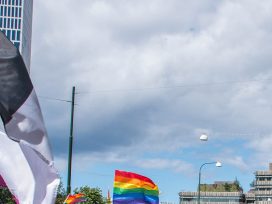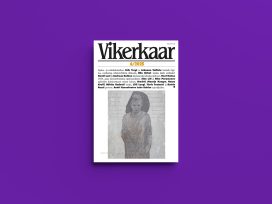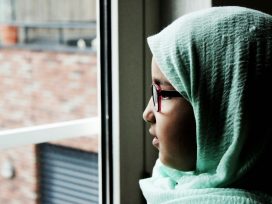Violeta Davoliute: Genocide research is not only very complex but also extremely politicized. Different communities interpret various traumatic events differently and disagree about the definition of the word “genocide”. Is it possible to research this phenomenon without getting involved in political or ideological battles?
Ugur Ümit Üngör: The German-Jewish sociologist Norbert Elias once said that there is an axis of tension between personal involvement and professional detachment. I think you need a certain level of involvement to get yourself going in the field and to choose to study the topic for years on end. On the other hand, you need detachment, otherwise you get carried away by your emotions – by righteous anger, a desire to strengthen your belonging to a certain community or something along these lines. Then you are straying away from scholarship and stepping into politics. I believe that, as scholars, our task is to register and to understand – the most difficult task. And when understanding has been reached, to leave it at that. That is why a comparative perspective is important; it helps to create a certain distance and to get a broader vision.
VD: You are of Turkish descent and wrote your first book about the Armenian genocide. You have also researched the Holocaust, the Gulag and the Holodomor, and now specialize in the comparative history of genocide. How did you get involved in this topic?
UÜÜ: Curiosity. I am driven by the need to understand the reasons and the dynamics of mass violence, its relationship to other historical processes. As far as my research on the Armenian genocide is concerned, one can call it an accident – I simply knew the necessary languages. I could have chosen genocide in Rwanda or mass violence in Cambodia, but then I would have needed to learn even more languages.
More generally, I was always interested in other cultures, relationships among different communities. Perhaps it is a natural feature of every immigrant? I was born in Turkey and moved to Holland when I was a year old. When I grew up in the 1980s and 1990s, most of the mass media here in Holland was American. I grew up with CNN and MTV so I feel at home in American culture as well. And that is more or less the story of my generation – one of very rapid cultural change. I was born a Turk to a family where my grandparents were illiterate peasants, became Dutch and later on became a kind of American. I can truly say that I not only live among several cultures, but I have embraced them.
VD: Do you believe that living among several communities can indeed help to maintain a certain distance while doing research on the historical traumas of different nations?
UÜÜ: I believe so, though certainly I can talk only for myself. I think that embracing several cultures and societies nurtures a certain immunity to nationalism. I belong to several communities, but I do not belong to any nationalist project. Dutch nationalists would reject me because I am Turkish, Turkish nationalists would want me to reject everything Dutch, but this is not possible because I am also Dutch. So I simply cannot accept the premises of nationalism because it would exclude a part of what I am.
I noticed that people, scholars included, with strong national loyalties find it difficult to empathize with the suffering of other groups because they draw a line. They say this is our suffering, this is us. As for those people over there, we are not interested in them. So when it comes to researching genocide, I think that people with a cosmopolitan outlook may be ahead of the game precisely because they do not have these strong national attachments. This creates a certain distance that I believe is healthy.
If you want to understand genocide, you have to think comparatively. You cannot lock yourself only into the Holocaust or the Armenian genocide because you may fail to notice same common underlying features of different historical events. The path to understanding this phenomenon is through comparison.
VD: How has the field of genocide research changed during the past ten or fifteen years?
UÜÜ: It has developed strongly. For example, some ten to fifteen years ago, here in western Europe, very little was known about the Gulag. It was unusual to compare the genocidal practices of the Soviet and Nazi regimes. But with the expansion of the EU, and after Ukraine expressed its wish to become a member of the Union, this topic gained much more importance and more comparative research was produced.
The opening of archives was another important stimulus. For example, the archives of the USSR were opened considerably under Boris Yeltsin. If there were any doubts about the fate of the 22 000 Polish reserve officers who were murdered in Katyn, we now have a one-page document that authorized their mass killing.
Many documents have been declassified, including on the deportations, so we now know about the deportations of the Chechens, the Crimean Tatars and others. This new information gave more ground for comparative research and helped to gain a broader perspective on the genocidal practices of totalitarian regimes.
In addition, a new generation of genocide researchers has come onto the stage. Most of them did not experience historical traumas personally. The first researchers of the Holocaust or the Armenian genocide were victims themselves: people such as Yehuda Bauer, Saul Friedlander and Elie Wiesel. They sought to testify to the suffering of their community to the world and they completed a great task. Who else could have done it?
VD: You talk about the mass murder of officers as genocide, but the legal definition of genocide does not include professions, or social classes such as the bourgeois, the kulaks or the peasants.
UÜÜ: The genocide convention of 1948 was drafted as a result of deliberation and negotiation between the western Allies and the Soviet Union. Raphael Lemkin, the man who invented the concept of genocide, wanted to include social classes, but the Soviets lobbied the UN and succeeded in excluding this aspect from the definition – probably because they knew that they had committed genocide based on social class.
But genocide has not only been about ethnic groups but also about social groups, elites, peasants, any social or economic class you can think of. There are excellent examples, unfortunately, of the destruction of all kinds of classes. The Soviets spoke of the need to eliminate the kulaks as a class. That meant seeking out and destroying every individual who happened to have that identity or who was believed to have that identity. In Cambodia, they killed everyone who wore glasses because they said they were intellectuals and were working with the West. That’s also a class of people – intellectuals.
I think that most historians and social scientists would now agree that the definition of genocide includes not only ethnic but also social groups. Thus, the historical and sociological definition does not match the legal definition of genocide. In the legal definition it is still officially only about ethnic groups and not political or social groups. But sociologically, genocide means the destruction of a group based purely on group – collective – identity, and not on something that you have done as an individual. That group identity can be based on any social or ethnic or religious criteria.
VD: Would you then support efforts made by such states as Lithuania to expand the definition of genocide to include social class?
UÜÜ: The inclusion of social class in the definition seems logical. However, when states get involved in the formulation of definitions of genocide, it is not because they are interested in the phenomenon intellectually, but because of their desire to exploit it for the purpose of identity politics. It doesn’t matter if it is Lithuania or Bulgaria or any other state. For example, during the war between Georgia and Russia in August 2008, both sides immediately accused each other of committing genocide. Georgia was accused of committing genocide against Ossetians and Russia of the same thing against Georgians in South Ossetia. And it isn’t only states that get involved in such manipulations, but also various pressure and identity groups. In this context, almost anything can be labelled genocide: colonialism, the spread of AIDS, abortion – global genocide against unborn babies – and so on.
VD: Isn’t it precisely this liberal broadening of the definition that leads people to describe any manifestation of mass violence as genocide?
UÜÜ: This danger can be avoided if we rely not on political speculation but empirical evidence. One must investigate each case individually: see what was done on the ground. Was there a mass elimination of a group based on its collective identity? What were the parameters of the act? But if we reserve the term genocide for only one type of mass murder, we will fail to see structural parallels among different forms of genocide. And we will fail to understand that genocide can be implemented not only, for instance, by using a system of camps, but also with machetes or “death marches”.
VD: But many still feel that to contextualize or to compare a genocide of such magnitude as the Holocaust to other genocides serves to trivialize its significance. At worst, comparisons and contextualization has led to the theory of “double genocide” in eastern Europe, which blames the Jews for welcoming the Soviet invasion and thus holds them accountable for the resulting persecution of Jews.
UÜÜ: In practice, you can easily tell when somebody wants to diminish the importance of the Holocaust. If someone says that Auschwitz was probably not that bad and that “we” suffered too, then that is trivialization and potentially genocide denial. But when someone says that the Holocaust is probably the most comprehensive genocide in European history, and that there are other genocides too, this does not diminish the significance of the Holocaust but simply adds more events and issues to expand our understanding of the genocidal processes.
The theory of “double genocide” is, of course, absurd. But one should not counter it with the notion that there was only one genocide. The historical reality is that there were multiple genocides, carried out in different ways and against various groups. Even Stalin’s actions in eastern Europe were multiple: mass executions, national and class deportations and so on. All these actions have their specificity, a different structure, and each one is unique. In his book Stalin’s Genocides, Norman M. Naimark talks about six or seven different types of genocide. For example, in 1932-33 you have the genocide of 4.5 to 5 million Ukrainians, and before that you have de-kulakization, and in 1937-1938 you have the Yezhovshchina (The “Great Purge”), which is another genocide. Then you have the destruction of the Belorussian intelligentsia, which started in 1920 and reached its zenith in 1937. Hence, we speak of Stalin’s genocides. Mind you, these were committed in peacetime and before World War II.
A similar diversity can be seen in Nazi Germany: there was the genocide of the Jews, of the Sinti and of the Roma. Three million Poles were eliminated – a great loss to that community. Another group was Soviet prisoners of war, who were simply crammed together into one territory and left to starve.
But to list these together, of course, does not imply a crude equation. When looking for structural parallels, one must always respect the historical uniqueness of each instance and research it first on an individual basis. A good example is what is now Belarus. When Nazi Germany invaded the USSR, it destroyed almost the entire Jewish community in Belarus. Incredible massacres took place, and when the USSR re-conquered the territory there were deportations of people who were against the regime, anti-Soviet partisans, collaborators. I don’t think that those specific deportations deserve to be equated with the genocide of the Jews; these historical events are far different in scope and in structure. But I do think that overall, Stalin’s treatment of several nations and groups was genocidal.
VD: What do you make of the claim made in the European Parliament Resolution on Totalitarianism that the Holocaust is unique?
UÜÜ: We talk about the uniqueness of the Holocaust to avoid these kinds of moral comparison, usually between the crimes of the Nazis and those of the Soviets. I’m against the kind of comparison that calls one better and the other worse, but I do think that we can compare the Nazis and Stalinists structurally and ideologically. Both regimes were ideologically committed to creating a utopia. In the case of Stalinism, it was class utopia, in the case of Nazism, racial utopia. Structurally these ideologies are very similar.
To compare the two regimes is not to deny that the Holocaust was unique. I think the crux of the matter is the death camps. The Gulag was made up of concentration camps and labour camps. There is no Soviet equivalent of Treblinka or Belzec, which were dedicated to killing and nothing else. That in itself makes the Holocaust unique.
On the other hand when you look at Stalinism, there are also unique aspects. For example, with Stalinism there is an unprecedented level of inward violence. Stalinists persecuted their own societies and even their own political party to an unimaginable degree. Everybody was a suspect, potentially an “enemy of the people”, and could end up in a mass grave or the Gulag. This level of paranoia, this casting of the net so wide that virtually anybody could become a victim or an enemy, is also unique.
So there are similarities and there are differences. They are instructive. They can teach us a lot. But we should not think about genocides in terms of better or worse, more or less unique, because such comparisons do not help to understand these complex historical events. To take a negative example, Daniel Goldhagen published a book on genocides called Worse than War. Worse than war? What does that mean? If I write a book about the enormous destruction and deaths of innocent people brought about by war, could I call it Better than Genocide? This is absurd. I do not think it is sensible or ethical to compare violence from a moral perspective, to try to evaluate whether one is better or worse than another.
VD: Why are such comparisons so popular?
UÜÜ: Communities often use their historical traumas to ground their ethnic self-validation, emphasize their historical uniqueness, consolidate themselves as a group. It is identity politics. Such interpretations of genocides often become part of various nationalist projects. The struggle for the special moral status of various genocides is also closely related to the struggle for moral immunity. The statements that “our” genocide was more “unique” than “yours” essentially means that I have moral immunity and you cannot criticize me. There are also concrete political and economic aspects to it. If you are seen as a victim, you get empathy and this empathy may allow you to form ideologies and pursue policies that would not be tolerated on the part of those not considered to be victims.
VD: This seems to represent a peculiar understanding of the status of victims.
UÜÜ: Yes, and I think it is closely related to the international human rights movement, especially in the West. One hundred years ago, nobody would say, “I have been a victim, you have to respect me.” At that time it would not have given you any respect. Might was right. You had power, you imposed it on your enemies, got what you wanted and that was it.
The human rights movement highlighted the importance of empathy. This is a positive development but we must recognize that the trauma of genocide sometimes reverses itself and we get a dynamic of conflict in which the victim group becomes a perpetrator group. It is because of the collective sense of insecurity, to prevent a second victimization. There are enough examples to demonstrate this: Armenians, Israelis, Serbs, Tutsis and others.
Take the case of Israel. Whenever there is criticism of this state, there are those who say: “You have no right to criticize us because we suffered the Holocaust.” And indeed, if not for the brutal genocide of the European Jews, the international community would be more assertive and unanimous in criticizing Israel for some controversial actions.
Or take the Armenian genocide. Armenian nationalists also justify their actions by the collective victim status. During the war in Karabakh, one could hear such arguments: “The Armenian genocide took place because we did nor fight back. If we do not resort to immediate action, a second Armenian genocide will take place. Therefore we have to be pro-active, pre-emptive and strike first at the Azeris to protect ourselves.” There was a similar situation with the Tutsis in Rwanda, who are now running a dictatorship there and periodically occupying parts of Congo.
So apart from this moral immunity, there are very concrete political gains to be made. You can actually score points by being the victim; such things as restitution of property, occupation of territories, or the exploitation of natural resources – for example in the case of Rwanda. This is a very concrete political and economic dimension.
VD: Why have we seen so much of this kind of identity politics in recent years?
UÜÜ: In western Europe, including Germany, the Holocaust was the benchmark of genocide. Genocide was always equated with the Holocaust, and the Holocaust was the only genocide. This attitude lasted at least until the war in Yugoslavia. Some commentators said there was no genocide in Serbia because there were no gas chambers. But this represents a distorted view of genocide. You must be much more phenomenological, if you will, and look at what is happening on the ground. You need to ask whether there was killing based on group identity. If there was, then it was genocide.
But the prevailing attitude was still to see everything through the lens of the Holocaust. We saw this in British newspapers with the photos of a Bosnian man, emaciated, standing in a concentration camp behind barbed wire, with the caption: “Bergen-Belsen 1992”. Only after the publication of this picture did people realize that genocide was actually occurring. But the photo had been doctored: that man was not inside the camp, he was outside the compound and the reporter took the picture from inside. The only way you can communicate the idea of genocide to western European culture is through the idea of a concentration camp.
But once the post-communist states joined the EU and started to push for more recognition of the legacy of Stalinism, the moral universe of western Europe began to be upset. For western Europe, World War II was very clear: there were good guys and bad guys. The good guys were the Allies in the West and also the Soviet Union, and the bad guys were the Nazis. But now you got these post-communist states coming and saying that things were not so simple, that there were at least two bad guys – Nazi Germany and the USSR – and that 1939 marked one occupation that was followed in 1944 by another occupation, not a liberation.
So now there is a new narrative and it is difficult to integrate it with the first because people struggle with thinking beyond the categories of good versus evil. In reality, it is perfectly possible for any war to have two bad guys, if one wants to insist on such categories.
VD: You seem quite pessimistic. How could things be improved?
UÜÜ: We have to realize that using historical trauma for the purpose of collective identity building and group consolidation is a dangerous practice. It certainly does not promote dialogue. Today, the biggest problem with the discourse of historical traumas is the lack of empathy and solidarity among victim groups. It is overshadowed by competition for recognition and ethnic validation. Aside from Germany, I know of no nation-state whose memory and identity politics includes the commemoration of a victim group other than themselves. Other nation-states most often chose to remember what they have suffered, but not the suffering they have caused others.
Turkey has a museum of the genocide against the Turks, and Serbia has a museum about the genocide against the Serbs. A really good example is Budapest, which has one of the most beautiful synagogues in Europe. There is a Holocaust museum there and, just a few blocks away, the so-called House of Terror. The Gestapo used to be located in this building and later the NKVD took it over. Interestingly, walking around the House of Terror, one can see that the main victims there are Hungarians and the main perpetrators are also Hungarians, members of the NKVD. In any case, despite the two places being virtually next door to each other, one gets an impression that the exhibitions present the experiences of two different countries. One can see no dialogue between them, rather competition.
I think that a lot more critical self-awareness is needed. Lithuanians, for example, might want to be a bit more concerned about their own involvement in the Holocaust, or their own role in the Soviet terror apparatus. The fact is that in the Soviet Union and in eastern and central Europe, locals were strongly involved in the terror apparatus and committed brutal acts against their own populations. They made lists of people, denounced them, dragged them out of their houses and so on. Of course, it was steered from Moscow and if the locals did not carry out those acts, then someone from Moscow would have come to do the job. Nevertheless, the reality is that those locals were found: the Ukrainian genocide involved Ukrainian communists, and the same applies to Belarus, Poland and also the Baltic states.
This is one of the unique features of Stalinism: communist genocides were to a large extent auto-genocides, the persecution and destruction of one’s own society. That is why it is so difficult to study such genocides – it is very painful. This kind of legacy is highly divisive as well.
VD: So you believe historical traumas will continue to haunt Europeans?
UÜÜ: I believe so. The fact is that several genocides have already taken place after 1945, when the words “never again” were uttered. In the Balkans, the Srebrenica massacre took place 50 years after World War II, right in the heart of Europe.
If the EU ever expands again, we will have even more legacies of genocide to deal with, to incorporate into the European narrative. If Turkey ever joins the EU, its state-led denial of the Armenian genocide will certainly become a common European problem. The more the EU expands, the more it will have to deal with different forms of mass violence, and with different practices of remembering, or not remembering, the past.






